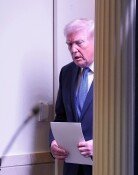Nuke Test Had Nothing to Do With S. Korea
Nuke Test Had Nothing to Do With S. Korea
Posted May. 26, 2009 05:24,
North Korea conducted its second nuclear test yesterday morning hours after its supreme leader reportedly sent condolatory messages to the family of the late President Roh Moo-hyun.
The Norths state-run Korean Central News Agency said Kim Jong Il sent his condolences to Rohs bereaved family at 6 a.m. yesterday. Seoul had interpreted this as a sign that the North could send a delegation for Rohs funeral to improve strained inter-Korean relations.
That optimistic view ended with the news of the Norths nuclear test at 10 a.m.
So why did the North conduct the test in this period of mourning in the South?
Pyongyang might have wanted to take full political advantage of the costly nuclear test. If it chose the date of the test considering the Souths condition, the North might have used this occasion to snatch world attention away from the South, where Rohs death has made domestic and world headlines.
Pyongyang might have wanted to seize this opportunity to show the world that it is a nuclear state and gain global attraction at the same time.
Moreover, the North could seek to ignite internal conflict within the South by offering to send a delegation for the funeral. A Seoul official said, (A visit by a North Korean) delegation could be difficult because of security reasons given the publics anger over North Koreas nuclear test.
Pyongyang might believe if Seoul rejects a North Korean delegation to go to the funeral, this could cause controversy in the South.
Others, however, say North Korea did not intentionally conduct the test at this sensitive time in South Korea. Certain experts say the test reduced criticism of the South Korean government that emerged in the wake of Rohs death. If Pyongyang conducted the test intentionally, it probably helped the Lee Myung-bak administration, which is worried over its alleged accountability in Rohs death.
Most experts, however, agree that North Korea conducted the test mainly to gain U.S. attention.
An underground nuclear test needs thorough preparation, like installing many cables and measuring equipment underground, said Hwang Joo-ho, a professor of nuclear engineering at Kyung Hee University in Seoul. The condition in South Korea wouldnt have been a factor.
Others say the North intentionally chose U.S. Memorial Day for the test. In 2006, Pyongyang fired missiles on U.S. Independence Day July 4 and conducted its first nuclear test on Columbus Day Oct. 9 that year.
kyle@donga.com ysh1005@donga.com







